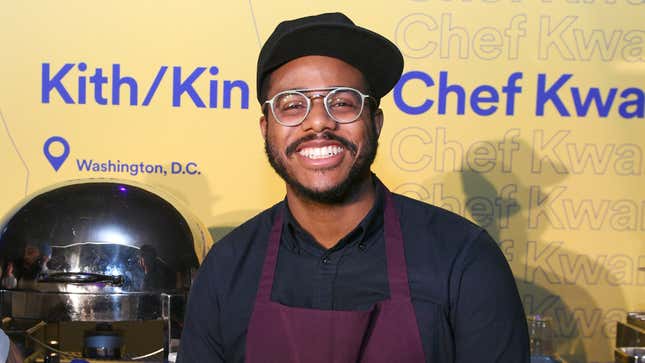
He won the 2019 James Beard Rising Star Award (among many other honors); co-wrote the poignant and powerful memoir Notes From a Young Chef (which is being developed into a film); competed for the title of Top Chef on Bravo’s long-running show; was a 2019 Root 100 honoree and helmed the kitchen of one of the best-reviewed restaurants in Washington, D.C. At only 30, Chef Kwame Onwuachi has done all of this and more—while steadfastly advocating for himself and other Black culinary talents.
“54 years ago is when the last restaurant was integrated and Jim Crow was lifted. And here I am, my ancestors’ wildest dreams,” he said while accepting his Rising Star Award in May of last year. “Thank you to my ancestors, who have worked in the kitchen for hundreds of years with no recognition, no choice; just in order to survive. This is for you.”
Now, the New York Times reports, Chef Onwuachi has resigned from Kith/Kin—the restaurant he named and opened within the InterContinental Washington D.C., basing its Afro-Caribbean cuisine on his own diasporic heritage (which includes ties to Louisiana, Jamaica, Trinidad, and Nigeria). After guiding the restaurant through a post-lockdown reopening in June, Onwuachi is now planning to pursue his own venture, citing the intellectual and creative capital he literally brings to the table as his reason. (The Times also notes the resignation of Kith/Kin’s Executive Pastry Chef Paola Velez, also co-founder of the recently launched Bakers Against Racism, “an ‘online virtual bake sale’ to benefit organizations that try to help Black people and communities. Velez will oversee pastry for two other D.C.-area restaurants.)
“Something that profits off of Black and brown dollars should be Black-owned,” Onwuachi told the Times. “It’s something that’s very, very important to me and something that I want to achieve in the future.”
The as-yet-unnamed venture will not be his first attempt at ownership; in 2016, Onwuachi opened the Shaw Bijou in a converted townhouse in D.C.’s Shaw neighborhood with an ambitious 13-course tasting menu. Shaw Bijou would close 11 weeks later, and by the end of 2017, Onwuachi was hired to develop and open Kith/Kin. Additionally, he experimented with a fast-food concept, opening two Philly Wing Fry food stalls in the city, with 50-day dry-aged ribeye cheesesteaks as the draw. That venture closed in November of last year, according to the D.C. affiliate of Eater, as Onwuachi was already teasing a pivot to a new project in addition to Kith/Kin.
And then came the outbreak of COVID-19 and an ensuing months-long lockdown. While Onwuachi told the Times his decision to depart Kith/Kin “was not directly related to the pandemic,” he shared that he’d used the time off to “think about what mattered to him.” Additionally, he spent several weeks volunteering with World Central Kitchen in his childhood neighborhood of the Bronx, and area notoriously hit hard in the first wave of the coronavirus outbreak, making free meals for locals and emergency medical workers.
“It was inspiring to cook for the community,” he told the Times. “It wasn’t, ‘Oh the nuances, this curry doesn’t have enough anise seed in it.’ They were just like, ‘Thank you for this food.’”
Onwuachi has yet to disclose the concept of his next restaurant or whether he’ll remain in D.C. or return to his native New York. Among future possibilities is a comeback of Philly Wing Fry, but as the chef explained, there are several options simmering. “I’m going to cook, I was born to cook, I have to cook,” he said. “But I do need to take some time to think about how to build a better future. And I need ownership to do that.”

